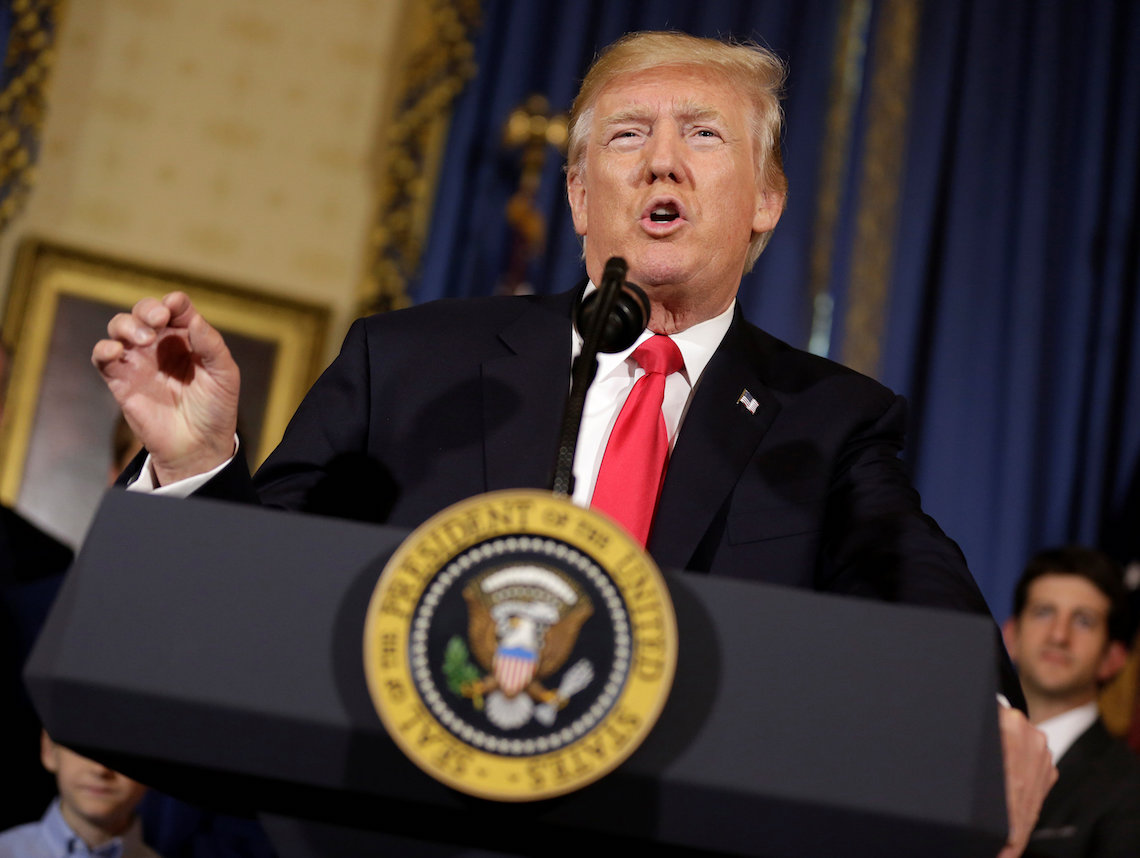 President Donald Trump on July 24. Photo by Joshua Roberts/Reuters
President Donald Trump on July 24. Photo by Joshua Roberts/Reuters On Oct. 12, President Donald Trump signed an executive order rolling back a handful of Obamacare’s regulations.
Patients and employers should celebrate the move. The administration is taking action where Congress could not, increasing the number of insurance choices available to Americans — and reducing their cost.
The order directs the Departments of Health and Human Services, Labor and Treasury to come up with regulations that would allow for three key changes.
First, Trump’s order aims to expand access to association health plans, or AHPs. These plans allow small, like-minded employers to join forces to purchase a large-group insurance policy together.
The Obama administration cracked down on AHPs by decreeing that small employers banding together under the banner of an association would not be eligible to buy a large-group policy to cover them all.
That was crucial, because Obamacare imposed many costly regulations and mandates on individual and small-group insurance but not on policies issued in the large-group market.
The administration is … increasing the number of insurance choices available to Americans.
Among those regulations are the essential health benefits mandates, which require all policies to cover 10 benefits, regardless of whether employers or beneficiaries want them.
These mandates inflate the cost of insurance. Many small businesses and employees would gladly take lower premiums and deductibles in exchange for policies that don’t cover expensive services.
But they don’t have that option; their only choice is expensive, comprehensive insurance. So it’s no wonder that only one-third of businesses with fewer than 50 employees offer health insurance — or that just one-third of 1 percent of employees at such firms have coverage through Obamacare’s Small Business Health Options, or SHOP, exchange.
Crucially, those with pre-existing conditions will be protected if their employer opts for an AHP. The executive order emphasizes that employers cannot exclude employees from joining the plan, nor can they charge different premiums to different individuals covered by the plan.
Trump’s executive order also relaxes restrictions on low-cost, short-term health insurance plans. Obamacare set the maximum term for such plans at three months; the executive order will probably extend that term to just under a year and allow the plans to be renewed.
Obamacare slapped strictures on short-term plans to try to force people into the insurance exchanges. But exchange plans have proven too expensive for many individuals, thanks to the many mandates governing them.
The third component of Trump’s executive order would boost the power of health reimbursement arrangements, or HRAs. These accounts enable employers to allocate tax-free dollars to employees to help them with qualified healthcare expenses.
HRAs are particularly popular with small businesses. Under Obamacare, those with fewer than 50 employees are not obligated to offer health insurance to their workers. Many do so anyway. Others may not be able to afford to provide coverage, especially if their only options are on Obamacare’s expensive marketplaces. HRAs can allow them to give their employees at least some help paying for care.
Under the executive order, the administration is likely to broaden the definition of qualified health care expenses to allow for HRA funds to cover insurance premiums. That could help scores of people who previously could not afford coverage pay for it.
Republicans have promised for the better part of eight years to expand access to low-cost coverage by repealing and replacing Obamacare. President Trump’s executive order finally makes good on that promise, albeit to a small degree.
And, on Oct. 13, President Trump announced that he would immediately stop paying the illegal CSR (Cost-Sharing Reduction) subsidies to insurers. These payments of $7 billion a year were never appropriated by Congress. A specific instruction to pay that money is required by the U.S. Constitution before federal money can be paid.
Sally C. Pipes is president, CEO and the Thomas W. Smith Fellow in Health Care Policy at the Pacific Research Institute.























 More news and opinions than at a Shabbat dinner, right in your inbox.
More news and opinions than at a Shabbat dinner, right in your inbox.